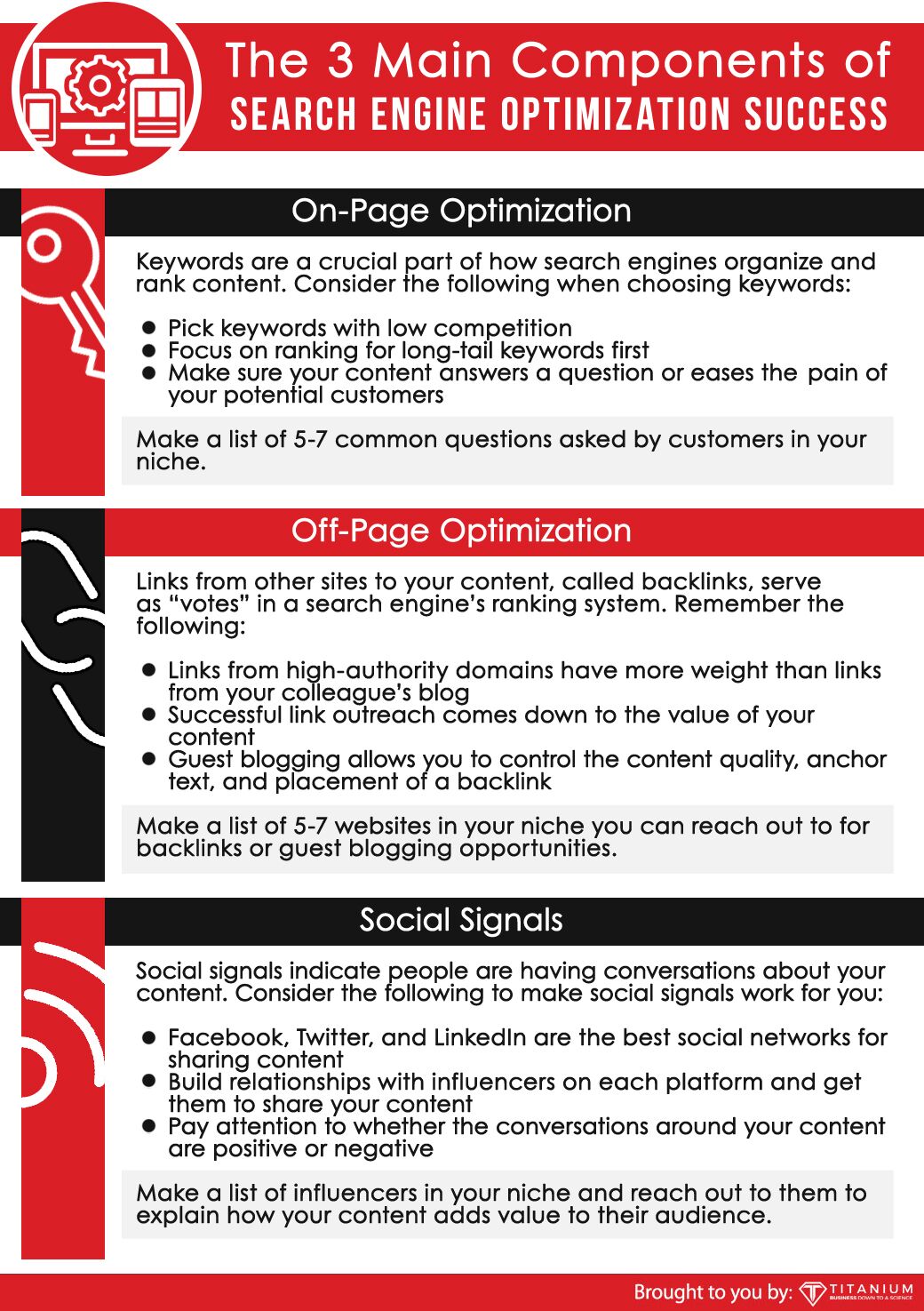Do Social Signals Help Your SEO?
This is the third and last part of this Search Engine Optimization thing that we’re doing, and we have gotten rave reviews about this, let me tell you.
Most people used to thing that Search Engine Optimization and getting their website to rank at the top of Google was some magical, mystical thing, and we’ve demystified it here with the first two episodes. And now the third episode is going to take it to yet another level, and that is a thing that you all understand pretty well, and it’s called social media.
You see, the first thing we talked about is that Google wants really, really good quality content on your website. We’ve got that covered. The second thing we said is Google wants to know that other high authority websites with high-quality content are linking to your website. That’s the second part. And the third part is only about five years old, and it’s been changing for the last five years, so some aspects of this are literally cutting-edge. They’ve been happening in the last few years or the last few months, even.
See, if you look at the history of Search Engine Optimization, what you find is this. The ‘90s was a decade that was mainly all about the content on your website. So search engines initially were built almost purely to look at the content on your website.
Then you look at sort of the 2000s, and what they were about from 2000 – somewhere around 2000 to 2010 – I would say it was all about backlinks, so you had content, and then you had backlinks added to it.

What is the Importance of Social Media in SEO?
And now the decade that we are in now – I don’t know what it’s called – the teens – whatever decade this is. It is the decade that is now all about social signals. It doesn’t mean that the first two parts go away; in fact, I can guarantee you those first two parts still play a bigger role in search engine algorithms than the third part.
So understand that content is still king. That is still number one. Number two is still backlinks, but now number three is very, very important, and then that is social signals.
What that means is this: if you have content on your website, what Google wants to see is Google wants to see that people are talking about your content on social media, especially social media sites such as Twitter and Facebook.
Now, if you’re looking at Instagram – Instagram can be a good one as well. Unfortunately, however, Instagram doesn’t allow you to have links within your posts. You only have one link on your entire account at the time of this recording.
Therefore, Instagram is not necessarily a great place for SEO reasons while it’s great for other social media aspects, not necessarily for SEO. But Twitter and Facebook are huge, and of course, there are all these other things like Pinterest and YouTube.
Ways to use Social Media to Drive Traffic to Your Website
All of these are a magnificent place to be able to create Search Engine Optimization for your website, but here’s the key. It’s not just about sharing a bunch of junk on social media.
What it is is you want to share relevant content that people on social media are going to look at, they’re going to engage with it, meaning they’re going to like it, they’re going to comment on it, and they’re going to click through to go to your website.
So if you’ve written a great article, if you have a great page on your website that provides information – not just junk you’re selling – but provides high-quality information, here’s what you do: you share something on social media that captures peoples’ attention.
How do you do that? You do that with text, images, videos, and other things like that. And then within that post, you need to have a link to the page on your website that you’re trying to promote.
This is critical because the best post on social media that doesn’t link to anything isn’t giving you any of that valuable traffic that you want. So you share this thing on social media, and now you’re going to get people going from that post to the page on your website.
And if the content on your website is good, they’re going to stick around, they’re going to read it, they might even tag your website as something they can come back to later, and even more importantly, they might take what you shared, and they might share it on their page.
And by the way, every once in a while, you share something that other people share. And then you see other people will share that thing that other people shared, and now your stuff is getting in front of audiences that you have never, ever had any connection with, and people who don’t know anything about you, and now they’re sharing your stuff.
When this happens, you get this massive viral effect online, and when you hear about something “going viral” – and it can happen, although you don’t have to get out every day and say, “How do I make something go viral?”
It doesn’t matter. If you can post something that gets 100 views, and then you get 15 people to click through and go to your page, hey, that’s 15 people who have essentially voted for your stuff by going to the page and especially if the content is good. If the content is things that people like that adds value to them so they stay on the page and they actually read the content.
And so what Google is constantly looking at is it’s looking at these social signals. If you’re sharing images that are high-quality that people like and relate to your topic and they keep sharing those images, and they all have these links in the posts to your article or to a page on your website, that’s another vote for you. Pinterest is an amazing tool to use.
If you can create really high-quality infographics, these are these images that sort of tell a story or teach something, we have my marketing company. We do a lot of infographics. We create these beautiful infographics that we put out there, and they have links in the posts to our website, so people can go back to the content that that relates to.
On YouTube, you can create high-quality videos – or, by the way, fun videos. See, high-quality doesn’t necessarily mean you spend a million dollars on it, although very, very well-done videos are really important, it doesn’t have to be. It could just be a selfie video.
Many of you listening to this have seen the little selfie videos that I make with my iPhone. But you found them to add value to you and therefore, you’ve been likely to share them with other people, to like them, to comment on them, to engage on them, and Google is watching all of this, right?
And as you share more high-quality stuff on your page, the value of your page in general in the eyes of Google goes up. And as the value of your page goes up, what Google does is Google starts to understand that you are more of an authority, and now everything that you share is more likely to go out there and be shared with other people, so that’s what you want to be doing.
Now look, this is the third part out of three different critical aspects of Search Engine Optimization, and it is not just for the business owners. It’s for anybody who wants to control their reputation management online.
What people are seeing when they search for your name as a person, what people are seeing when they search for your company, and more importantly, what are people finding when they search for a service or a product, or they have a question. Is your website the one that pops up at the top of Google? And if you can get that to be the thing that happens every time someone searches for something related to your industry, you, my friend, will have leads coming in for the rest of your life.
And that’s what I love about all of this Search Engine Optimization stuff is that when you do Search Engine Optimization, this is not like paying for ads. When you get your website to start ranking in Google and other search engines, you, my friend, are going to be there essentially with very little work for the rest of your life.
That is pretty fricking cool, meaning you do the work now, you write high-quality content now, and that content stays for many, many years to come as long as it’s still relevant. And by the way, you can continue to update the content. Google lets you do that, so you can make it better and you can add things to it. You can make it newer and more relevant to today’s. Eh, you do that, Google is going to love you.

The Three Key Components of SEO
It is going to show you to people who are looking for your stuff, and remember these three aspects: on-page optimization, meaning have great content on your website. Number two, off-page optimization. Most importantly, having high-quality links coming from high-quality websites that have high-quality content, ideally written by you, by the way.
And number three, get those social signals by having links to those pages, shared on social media with a link back to your stuff. Now, it’s got to be social media sites that get a lot of traffic, so people actually engage with these posts.
That’s what Google is looking for. You do those three things, and those three critical, critical aspects of Search Engine Optimization are going to catapult you to the top. So if you want to do it yourself, do it yourself, my friend. If you want to have someone else do it, find a company that does it the right way.
Now, of course, you can use my company, Titanium Marketing, but that’s not what this is about. We’re one of many companies that does it right. But if you’re going out there trying to get a company to do this, make sure you’re asking the right questions and make sure they’re going to be able to create you high-quality, relevant content.
And if they tell you their stories about how they’re doing this, ask them to show you the proof. Ask them to show you the backlinks they’ve gotten other clients. Ask them to show you the infographics they’ve created for other clients. Ask them to show you the YouTube videos, the PowerPoint presentations, and a thousand other things they should be doing for all of their clients.
If they claim to be a Search Engine Optimization company and they cannot show you the trail of a high-quality social media post linking to high-quality content on a website or high-quality third-party websites with really good content linking to their client’s sites, again, high-quality pages with really good content. If they can’t show you that, then they are not doing Search Engine Optimization. What they’re doing is some variation of it which might be okay, but it is not worth your money.
So reach out to us if you need help. We do free website audits and all that stuff. Just go titaniummarketing.com. Otherwise, get out there, do what you can, make your website better, improve your online presence. And by the way, in a future episode at some point, I’m going to talk to you about reputation management, above and beyond just Search Engine Optimization, how can you protect your own personal reputation online?
So when people search your name, when people type in and they Google Arman Sadeghi or they google Jane Smith, how do they (1) get you and not the other Jane Smiths out there, right? And number two, how do they get the pictures you want them to see, the websites you want them to see, and the content you want them to be exposed to?
That’s a really important topic and we’ll talk about at a completely separate time. I’m sorry to tease you with that but tune in. I don’t know what episode that’s going to be, maybe five, ten episodes from now. But keep listening to these podcast episodes. I love having you guys here and hey, get out there, get your social media going, get those signals going back to your website, and always, please, lead with your heart.




